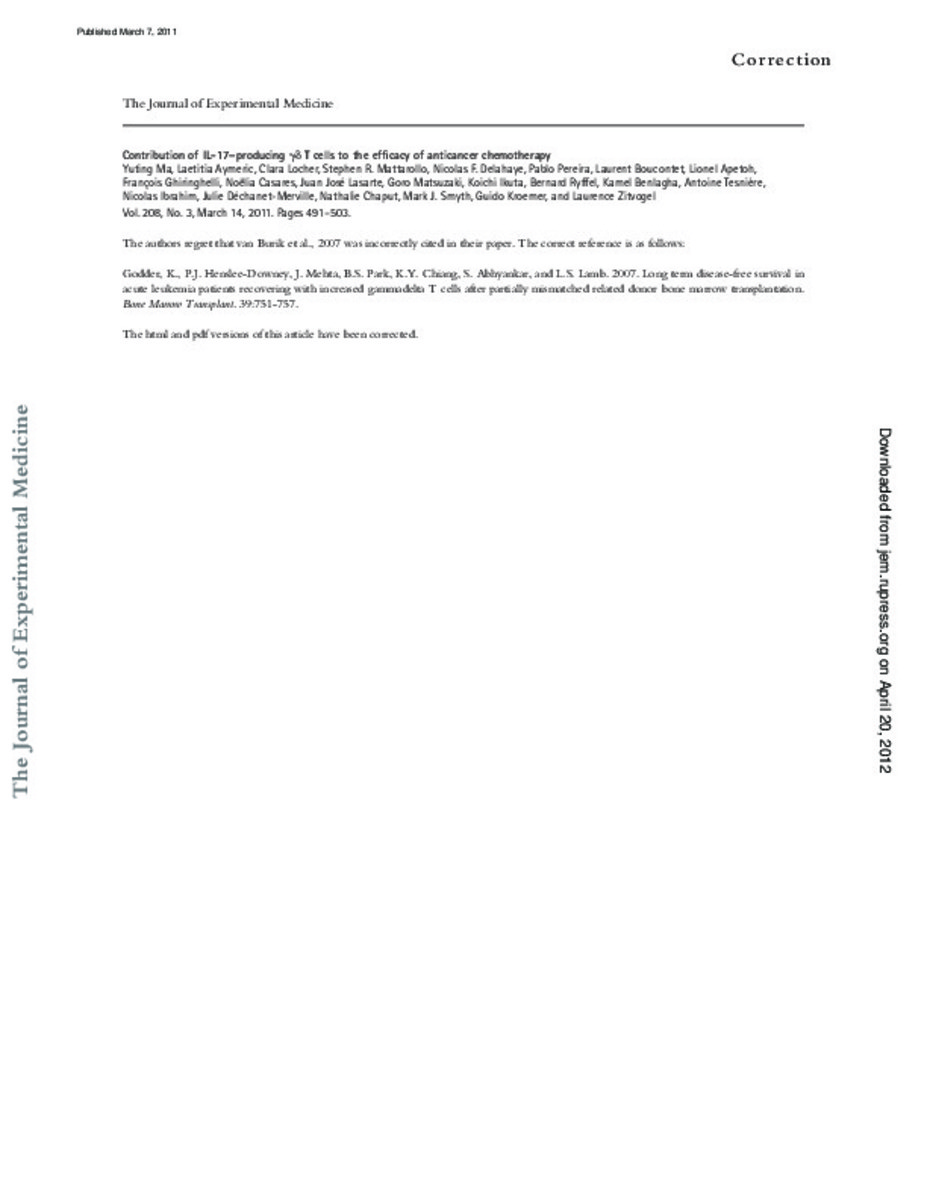Full metadata record
| DC Field | Value | Language |
|---|---|---|
| dc.creator | Ma, Y. (Yuting) | - |
| dc.creator | Aymeric, L. (Laetitia) | - |
| dc.creator | Locher, C. (Clara) | - |
| dc.creator | Mattarollo, S.R. (Stephen R.) | - |
| dc.creator | Delahaye, N.F. (Nicolas F.) | - |
| dc.creator | Pereira, P. (Pablo) | - |
| dc.creator | Boucontet, L. (Laurent) | - |
| dc.creator | Apetoh, L. (Lionel) | - |
| dc.creator | Ghiringhelli, F. (François) | - |
| dc.creator | Casares, N. (Noelia) | - |
| dc.creator | Lasarte, J.J. (Juan José) | - |
| dc.creator | Matsuzaki, G. (Goro) | - |
| dc.creator | Ikuta, K. (Koichi) | - |
| dc.creator | Ryffel, B. (Bernard) | - |
| dc.creator | Benlagha, K. (Kamel) | - |
| dc.creator | Tesniere, A. (Antoine) | - |
| dc.creator | Ibrahim, N. (Nicolás) | - |
| dc.creator | Dechanet-Mervill, J. (Julie) | - |
| dc.creator | Chaput, N. (Nathalie) | - |
| dc.creator | Smyth, M.J. (Mark J.) | - |
| dc.creator | Kroemer, G. (Guido) | - |
| dc.creator | Zitvogel, L. (Laurence) | - |
| dc.date.accessioned | 2012-04-23T07:42:00Z | - |
| dc.date.available | 2012-04-23T07:42:00Z | - |
| dc.date.issued | 2011 | - |
| dc.identifier.citation | Ma Y, Aymeric L, Locher C, Mattarollo SR, Delahaye NF, Pereira P, et al. Contribution of IL-17-producing gamma delta T cells to the efficacy of anticancer chemotherapy. J Exp Med 2011 Mar 14;208(3):491-503. | es_ES |
| dc.identifier.issn | 1540-9538 | - |
| dc.identifier.uri | https://hdl.handle.net/10171/21722 | - |
| dc.description.abstract | By triggering immunogenic cell death, some anticancer compounds, including anthracyclines and oxaliplatin, elicit tumor-specific, interferon-γ-producing CD8(+) αβ T lymphocytes (Tc1 CTLs) that are pivotal for an optimal therapeutic outcome. Here, we demonstrate that chemotherapy induces a rapid and prominent invasion of interleukin (IL)-17-producing γδ (Vγ4(+) and Vγ6(+)) T lymphocytes (γδ T17 cells) that precedes the accumulation of Tc1 CTLs within the tumor bed. In T cell receptor δ(-/-) or Vγ4/6(-/-) mice, the therapeutic efficacy of chemotherapy was compromised, no IL-17 was produced by tumor-infiltrating T cells, and Tc1 CTLs failed to invade the tumor after treatment. Although γδ T17 cells could produce both IL-17A and IL-22, the absence of a functional IL-17A-IL-17R pathway significantly reduced tumor-specific T cell responses elicited by tumor cell death, and the efficacy of chemotherapy in four independent transplantable tumor models. Adoptive transfer of γδ T cells restored the efficacy of chemotherapy in IL-17A(-/-) hosts. The anticancer effect of infused γδ T cells was lost when they lacked either IL-1R1 or IL-17A. Conventional helper CD4(+) αβ T cells failed to produce IL-17 after chemotherapy. We conclude that γδ T17 cells play a decisive role in chemotherapy-induced anticancer immune responses. | es_ES |
| dc.language.iso | eng | es_ES |
| dc.publisher | Rockefeller University Press | es_ES |
| dc.rights | info:eu-repo/semantics/openAccess | es_ES |
| dc.subject | Antineoplastic Agents/pharmacology | es_ES |
| dc.subject | Interleukin-17/physiology | es_ES |
| dc.subject | Receptors, Antigen, T-Cell, gamma-delta/physiology | es_ES |
| dc.subject | Sarcoma, Experimental/immunology | es_ES |
| dc.subject | T-Lymphocyte Subsets/physiology | es_ES |
| dc.title | Contribution of IL-17-producing gamma delta T cells to the efficacy of anticancer chemotherapy | es_ES |
| dc.type | info:eu-repo/semantics/article | es_ES |
| dc.relation.publisherversion | http://jem.rupress.org/content/208/3/491 | es_ES |
| dc.type.driver | info:eu-repo/semantics/article | es_ES |
Files in This Item:
Statistics and impact
Items in Dadun are protected by copyright, with all rights reserved, unless otherwise indicated.






